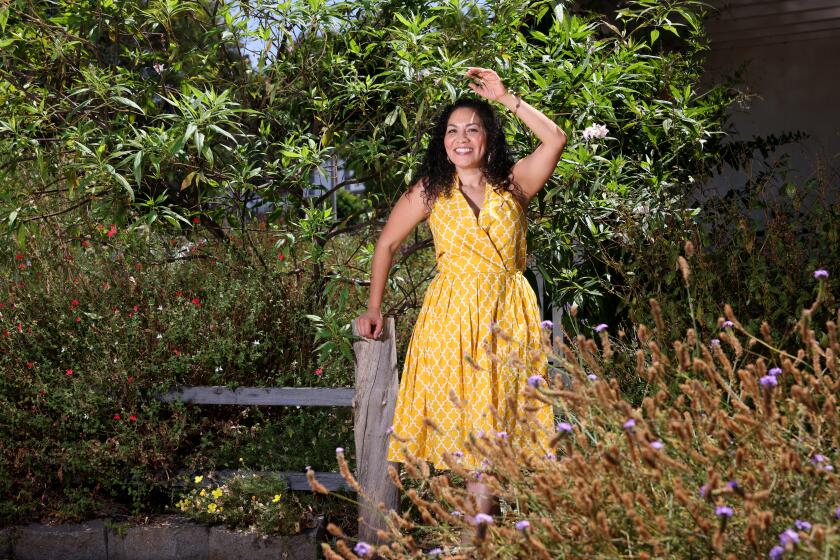Making A Difference in Your Community : Docents Turn Public On to Santa Monicas
Volunteering doesn’t always mean working in hospitals, schools and homeless shelters. For the 85 volunteer trail guides known as the Topanga Canyon Docents, the workplace features breathtaking vistas, meadows of golden grass, blue skies dotted with circling birds of prey and cool breezes that whisper their way from the Pacific Ocean through the canyons of the Santa Monica Mountains.
“I’ve been a docent (another term for tour guide) for two years, but I’ve been hiking the Santa Monicas for 12,” said 35-year-old Woodland Hills resident Donna Potter, who was recently named president of the nonprofit group.
Founded in 1973 to introduce the public to the newly formed national, state and county parks of the Santa Monica Mountains National Recreation Area, the Topanga Canyon Docents are funded by training fees, member dues, contributions and grants.
“Our main concern is educating the public on conservation and how important our wilderness areas are,” Potter said.
On a recent hike through Topanga State Park, nestled in the summit regions of Topanga Canyon, Potter shared her years of accumulated knowledge with some of the nearly 50 fourth-graders who came from Haddon Avenue School in Pacoima to participate in the docents’ Tuesday morning “school walks” program.
The docents also lead a “public walks” program on Sundays from 1 to 3 p.m. Both programs run from September through June.
Competing with lizards and a host of crawly creatures that invariably usurp the kids’ attention, Potter perseveres, describing the surrounding plants and animals and explaining how the native Chumash Indians used them to make food, clothes, medicine and tools.
At almost every stop along the way, she pulls something out of her fanny pack to share with the young hikers: throat lozenges made from the herb horehound that abounds in the mountains, edible chia seeds from the black sage plants that line the trails, a dice-like game made from six walnut shell halves.
Ironically, it’s a strand of grass known as red-stem filaree that finally enthralls the youngsters.
Giving each student a strand, the youngsters watch mesmerized as the moisture in their fingers causes the blades to twist and curl.
“That allows the grass to grab hold of a rock or soil so that its seed can grow,” Potter tells the entranced group. Many carry their filaree for the duration of the hike.
The high point of the two-hour trek is a viewpoint overlooking Santa Monica Bay.
Trailing behind Potter’s group, docent Len Milner is telling another party about the dreaded stink beetle.
“This beetle protects himself just like a skunk,” says Milner, a retired purveyor of lighted ceiling fixtures who leads walks with his wife Sue. “If something is going to eat him, he sticks his fanny up in the air and squirts out a stinky yellow substance.”
Mary McCormick of Thousand Oaks, a six-year veteran of the Topanga Canyon Docents, which in December won a Points of Light Award from the U. S. Department of the Interior, says getting young people interested in the outdoors is her main mission.
“With all of the environmental problems and how we’ve fouled everything up, our best shot is with the children,” she says. “I tell them it’s theirs to take care of and if they don’t it will be gone. It’ll be solid cement.”
While the youngsters settle at some picnic tables for a brown-bag lunch, 10-year-old Freddy Bocanegra, himself a budding expert on lizards, bugs and anything that slithers, says he would like to lead walks through the mountains when he gets older.
“Maybe I would tell them about the animals and beetles so they would know about all that stuff,” he explains.
The Topanga Canyon Docents welcome new volunteers, especially bilingual docents who can lead school walks for students whose first language is not English.
“It would help a lot to have more ethnic diversity among the docents,” Potter said.
Training is provided. Anyone interested in volunteering should call (818-881-9063).
Sign up for The Wild
We’ll help you find the best places to hike, bike and run, as well as the perfect silent spots for meditation and yoga.
You may occasionally receive promotional content from the Los Angeles Times.



